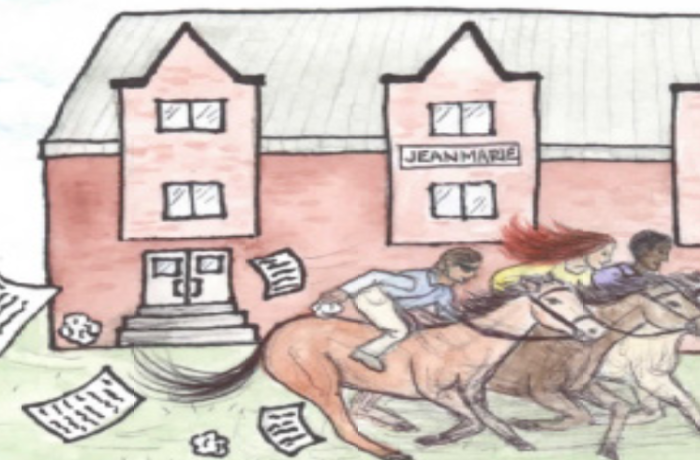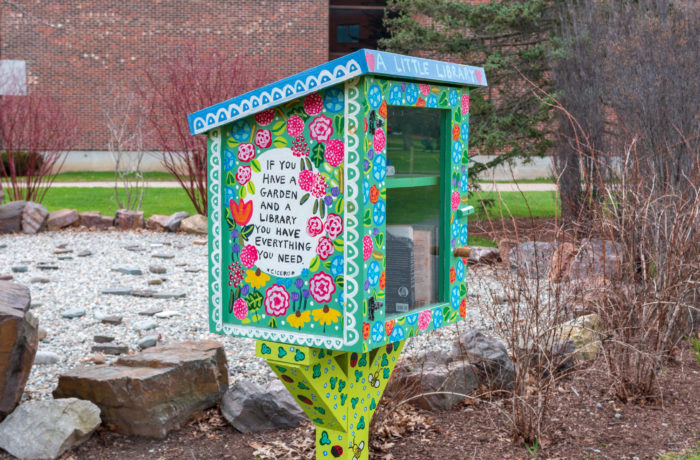
By Emma Rippe and Nathan Terry
In the office of Reza Ramazani, a poster of an ancient building in Iran hangs on the back of his door. A well-worn bench for students sits beside piles of books and papers, beneath a wall hung with certificates from his doctoral work and other professional accomplishments.
On another floor in St.Edmund’s hall, in the office of Christine Bauer-Ramazani, three small replicas of Colombian chicken buses, Chivas, sit on the shelves left of her desk. As a professor of applied linguistics, she hears many student stories from around the world, and her office is filled with knickknacks from their countries. Bauer-Ramazani has duel citizenship with the US and Germany.
For the professors, who married in Colorado years ago after meeting on a different campus, and for whom international knowledge and connection are critical, the United States has been home for a long time. But the policies of President Donald Trump’s administration have suddenly made their home of 40 years feel very foreign. In fact, they feel threatened and wonder about a lack of support on campus. Not only is the policy ruining their daughter’s wedding plans to include Iranian relatives, it is making them question whether they should remain in the country.
“I am asking a simple question,” Ramazani recently told The Defender. “What have
I done to American people, that I deserve this kind of treatment?”
“I am proud to be an Iranian, but I have been in this country for 40 years and I want to emphasize, I am a legal resident of this country,” Ramazani said. “They need to explain it to this old man who is suffering. ”
With the recent executive order by President Donald Trump, many immigrants to the United States are afraid to leave the country and fear deportation in the future.The executive order bans immigration to the United States from seven predominantly Muslim countries: Iran, Iraq, Libya, Somalia, Sudan, Syria and Yemen. The ban is for 90 days, although has the potential to be extended. Since many people have family members living abroad in countries that are subject to the ban, immigrants across the country fear that they may be unable to see loved ones any time soon. At the time of press, the ban was under review in federal court.
Ramazani believes that the ban is highly unnecessary. “Is that going to make our country safer? And when they treat a legal, law-abiding citizen, green card holder like me, don’t you think this is just to relate me to the ISIS and those idiots that actually hate this country?”
“My wife was devastated, and my daughter was devastated. My daughter is in the process of putting her wedding together. This is inhuman. This country should be ashamed of themselves, and the people at this college who didn’t come to my support and support of my daughter just with an email, they should be ashamed of themselves.”
Ramazani says that his daughter said that she no longer wants to have her wedding in this country, “I was planning on spending a lot of money on one daughter I have,” Ramazani said.
As a professor of economics, Ramazani said that he felt that he had a moral obligation to have a discussion with his students in his class.
“We live in a free society. That’s the reason I came to this country and I believe there is a system of checks and balances,” said Ramazani. “I have never been insulted, I have never been in fear of the past four years than the past few days after this decision. I went to class and told my students that I want to put a human face when you hear someone from Iran with a green card, I am one of those people.”
Of his students and their parents who voted for Donald Trump or that are supporting this particular policy, Ramazani asked, “Why do they have a reason to fear me? I told my students, as an American student, the only fear you should have from me and the only way I might harm you, is flunking you because you haven’t done anything in my class.”
Professor Elizabeth O’Dowd, a Professor of Applied Linguistics/TESOL at St. Michael’s, says that the ban had a large effect on many of the international students, both past and present. “Most of the international students are pretty shocked,” O’Dowd said. ”They hate seeing the victimization and they feel badly for their former classmates outside the country. They all stay in touch, so it affects all of them.”
For Christine Bauer-Ramazani, speaking about how their family was affected was emotional. Her voice cracked and her eyes were teary as she spoke with The Defender. “It’s been very difficult for our family. My daughter in particular is very upset; my daughter is an American citizen and my husband’s relatives are of course abroad. My husband’s relatives are very well educated Iranians, as most Iranians are. For the wedding, they may not have been able to come even under the previous administration, I don’t think they are issuing visas just for Iranians to come and visit here. He has cousins that are Canadian citizens but of Iranian descent, and they cannot even come to her wedding.”
Reza Ramazani spoke about how he received many supporting emails from his students, yet not as many from his faculty/staff and colleagues. He was expecting his colleagues to pick up the phone or send emails like his students. “Shame on them,” Ramazani said.
“I am a taxpayer, I am one of the hard working faculty, I have been good to this country and the evidence is black and white,” Ramazani said.” This is not the way to treat a valuable member of your damn society.”
“You are destroying a family with your stupid policy and nobody is saying anything, not even the faculty is saying anything and they call themselves the most progressive people at this college. Shame on them.”
“If I cannot rely on some of my friends and my colleagues, then I can’t have much expectation from American politicians to see how painful these things are,” Ramazani said.
Both the Ramazani’s quoted Martin Luther King Jr. in their interviews? “In the end we will remember, not the words of our enemies but the silence of our friends.”


